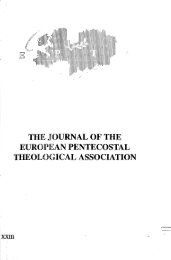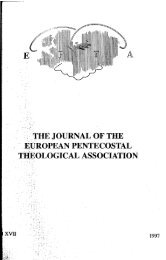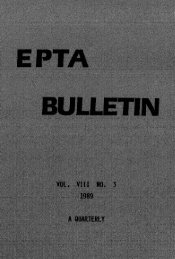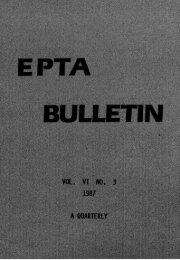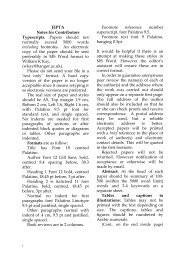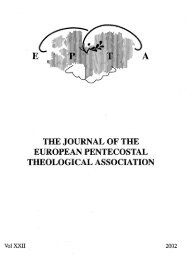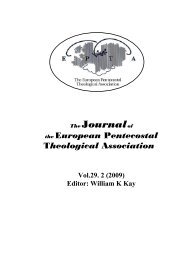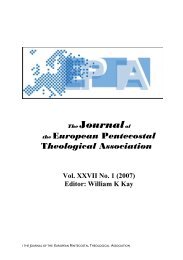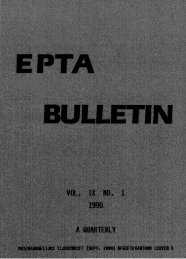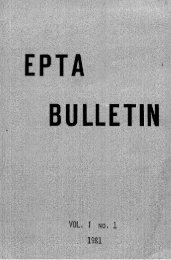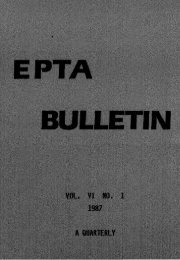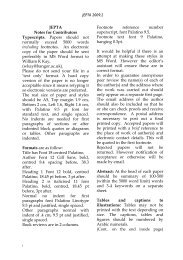jepta 2001 21 - European Pentecostal Theological Association
jepta 2001 21 - European Pentecostal Theological Association
jepta 2001 21 - European Pentecostal Theological Association
You also want an ePaper? Increase the reach of your titles
YUMPU automatically turns print PDFs into web optimized ePapers that Google loves.
The Journal of the <strong>European</strong> <strong>Pentecostal</strong> <strong>Theological</strong> <strong>Association</strong>, Vol. XXI, <strong>2001</strong><br />
The goal is not structural unity, but rather the fostering of this<br />
respect and mutual understanding between the Catholic church<br />
and classical <strong>Pentecostal</strong> groups.'<br />
What has changed through the years is the list of participants. Following its<br />
initial round of discussions, the Secretariat for Promoting Christian Unity spoke<br />
with the <strong>Pentecostal</strong> Steering Committee and asked that the <strong>Pentecostal</strong> team be<br />
reconfigured. The Roman Catholic Church was not interested in speaking to<br />
Charismatic Anglicans, Presbyterians, Lutherans, Orthodox, or French Reformed<br />
believers apart from their own specific contexts. And the Pontifical Council<br />
made it clear that it entered into dialogue with <strong>Pentecostal</strong>s because it wanted to<br />
speak with classical <strong>Pentecostal</strong>s. Beginning in 1978, therefore, the <strong>Pentecostal</strong><br />
team invited only members of classical <strong>Pentecostal</strong> churches and did not include<br />
members of the charismatic renewal within the historic churches. Since that time,<br />
a small leadership core has attempted to draw paties from throughout the world<br />
that are able to enter into theological discussion. On the whole, this method has<br />
worked well, though there are some major problems yet to be resolved, such as<br />
better representation from Latin America, Africa, and Asia, and women as well as<br />
men.<br />
It should be recognized that this Dialogue has always received official support<br />
and representation from the Roman Catholic Church. This is still not the case<br />
among the <strong>Pentecostal</strong>s. A few <strong>Pentecostal</strong> groups, however, have embraced this<br />
Dialogue and its work in recent years. Among them are the Apostolic Faith<br />
Mission (South Africa), the International Evangelical Church, the International<br />
Church of the Foursquare Gospel, the Open Bible Standard Churches, the<br />
<strong>Pentecostal</strong> Assemblies of Canada, the Church of God of Prophecy, the Mission<br />
lglesia <strong>Pentecostal</strong> in Chile, and at the level of official observers, the<br />
Broederschap van Pinkstergemeenten of the Netherlands.<br />
Others have sent official participants from time to time (e.g. Church of God<br />
(Cleveland, TN), <strong>Pentecostal</strong> Holiness, Church of God in Christ), but have not<br />
done so in recent years. Still others have asked not to be identified because of<br />
concerns they have about how some of their people might respond. Some have<br />
chosen to treat the Dialogue with benign neglect. Still others, such as some of<br />
my sisters and brothers in the Assemblies of God, continue to work tirelessly to<br />
put an end to the Dialogue by calling for the discipline of its participants or<br />
suppressing news of its work among their constituents. As a result, some<br />
' "Evangelization, Proselytism and Common Witness, 1990-1997," 2, in Jefftey Gros, FSC,<br />
Harding Meyer, and William G. Rusch, Eds, Growth in Agreement 11: Reports and Agreed<br />
Statements of Ecumenical Conversations on a World Level, 1982-1998, Faith and Order Paper<br />
No. 187 (Geneva, Switzerland: WCC Publications 1 Grand Rapids, MI: William B. Eerdrnans<br />
Publishing Company, 20001,753.<br />
Roman Catholic-<strong>Pentecostal</strong> Dia1ogue:Some <strong>Pentecostal</strong> Assumptions:<br />
Cecil M. Robeck, Jr.<br />
<strong>Pentecostal</strong>s and even some Roman Catholics have questioned the value of the<br />
Dialogue.<br />
If this is to change, it is essential that <strong>Pentecostal</strong>s approach dialogue with a<br />
thorough understanding of the Roman Catholic Church from a post-Vatican II<br />
perspective, and not merely from the stereotypes of Rome that are rooted in the<br />
16th Century or our own personal pain. The Roman Catholic Church entered the<br />
modem world substantially through Vatican Council 11, and the Vatican deserves<br />
credit for the growth that the Roman Catholic Church has made. But all the<br />
changes that are necessary to make the Dialogue more fruitful do not belong to<br />
the <strong>Pentecostal</strong> side. Roman Catholics need to reassess how they view<br />
<strong>Pentecostal</strong>s. Some lump all <strong>Pentecostal</strong>s together, place them in the larger<br />
phenomenon of Fundamentalism, and simply write them off as members of a<br />
"religious right." They view them as fanatics, with no theological ground on<br />
which to stand. But are they willing to explore the beliefs and practices that<br />
<strong>Pentecostal</strong>s hold as dear<br />
Only this past week, I received an email from ZENIT, a daily dispatch from the<br />
Vatican offering, according to its heading, "The World Seen from Rome." I was<br />
disappointed to read an article titled "Sects Aiming to Influence Latin American<br />
Politics." The dateline was Munich, Germany, April 9, <strong>2001</strong>. It explained that<br />
Bishop Jorge Jim nez Carvajal, President of the Latin American Bishops'<br />
Council (CELAM), was attending meetings in Germany where he complained<br />
that these "sects" were worrisome because they were (a) entering into Latin<br />
American politics in large numbers and (b) they were being well financed<br />
through a "large economic patrimony" from unnamed "U.S. -based groups."<br />
Furthermore, it named the "Universal Church of the Kingdom of God [Sic.],"<br />
headed by the Brazilian Edir Macedo as especially dangerous because it has<br />
allegedly "created an astounding network of compulsory contributions from his<br />
followers, resulting in the establishment of a veritable empire of communications<br />
and banks in Brazil."' Bishop Carvajal went on to complain that the funding of<br />
this <strong>Pentecostal</strong> denomination, as well as those of other so-called "sects", was<br />
large because it was augmented by a "compulsory" tithe of lo%.'<br />
' I know that the Church of the Universal Reign of the Kingdom of God is in many ways a<br />
problematic representative of <strong>Pentecostal</strong>ism, and as a result there are <strong>Pentecostal</strong>s who would<br />
like to distance themselves from this church. But on what basis can this legitimately be done I<br />
believe that so long as they claim to be <strong>Pentecostal</strong>s, and they are by whatever definition we<br />
might use these days, we cannot treat them as though they are not <strong>Pentecostal</strong>. If we believe<br />
them to be problematic, then it is incumbent upon us to find ways to talk with them and to share<br />
our concerns with them in order to change their behavior. But that action presumes that we will<br />
also be open to hear their criticisms of us.<br />
The ZENIT web page is at htm;l/www~.<br />
The date and number of the article "Sects<br />
Aiming to Influence Latin American Politics," is ZE010409<strong>21</strong>.



